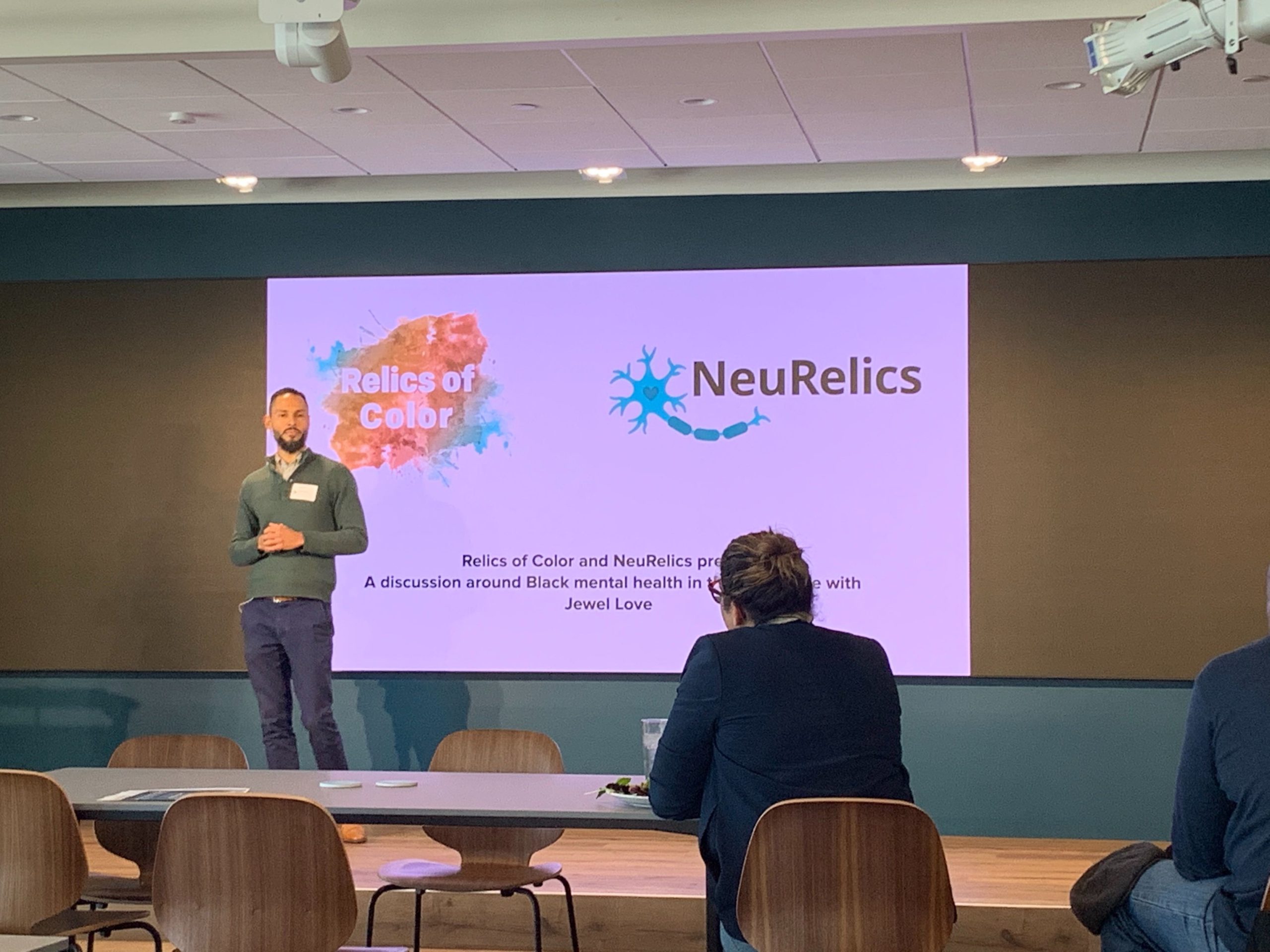One of my favorite things about New Relic is the culture—one of our core values is authenticity. I was met with amazing support when I made it known that, for this year’s Black History Month celebration, I wanted to address the stigma surrounding mental health in the black community. And when we met Jewel Love, MFT, a licensed psychotherapist and the founder of Champions of Mental Health, it became clear that we had found the perfect speaker for an event at our San Francisco HQ.
Jewel also founded Black Executive Men, which is now a national leader in the effort to advance psychotherapy, raise public awareness, and transform the way society responds to black men in corporate America who are exposed to toxic stress. Through individual psychotherapy, group workshops, and annual conferences, he equips black men and their loved ones with tools for inner peace.
Relics of Color and NeuRelics
Aligning on the topic of mental health presented an excellent opportunity for the Relics of Color and NeuRelics Employee Resource Groups (ERGs) to plan and co-sponsor an event that we hoped would be valuable. The NeuRelics ERG focuses on neurodiversity and mental health, and Relics of Color seeks to build a caring, engaged, and active community for People of Color at New Relic.

Mental health challenges
According to the National Alliance on Mental Illness, one of five adults in America will experience mental illness, such as bipolar disorder, depression, or anxiety. Many people with mental illness succeed in corporate America, but it can take its toll. And workplace stress can cause up to $190B in U.S. healthcare costs annually.
According to Love, depression is the leading cause of workplace productivity loss, and he sees fewer folks in the black community reporting mental health challenges and seeking treatment. At our event, people shared some of their struggles, such as exhaustion, helplessness, the stress of managing a job and finances, stigma, shame, and self-consciousness.
Reducing the stigma
More people are starting to talk about mental health, from Kanye West openly discussing his struggles with bipolar disorder to NBA players talking about depression. Even Beyonce and Jay-Z shared their experiences with couples counseling. Having public figures address these topics helps further the discussion.
Thankfully, there is also a movement in corporate America to reduce the stigma around mental health. But there’s still healing work to do. Some black people are concerned that if they talk about mental health, they will be perceived as weak, broken, or lost. There’s also the myth that “only white people go to therapy.” And we’ve heard that some people are concerned about bringing their problems to work. Or they may worry about a colleague or manager finding out they are struggling or seeking therapy.
Speaking from experience
This event was extremely important to me because I am well aware of the benefits of seeking help for mental health. When I was young, it became difficult to regulate my emotions. Essentially, I lived in a world of extremes. My days were either completely good or completely bad. I didn’t understand why I had these issues, and I couldn’t talk about it because I was taught not to show “weakness.” Eventually, my mother took me to see a therapist, and I was diagnosed with Borderline Personality Disorder (BPD). During those initial sessions, I learned so much about what was happening to me. I was taught about triggers. I was able to speak freely about my feelings. And I also learned how to spot the patterns of behavior and overcome them.
During the event at New Relic, others shared how talking to a therapist differs from speaking with a friend or a family member. With a therapist, you can talk about anything, and it’s safe—they mostly listen, unless you request feedback. And the result of therapy is helpful for many. Therapy can leave you feeling as though a weight has lifted, and that your feelings are natural. At our event, some folks said that therapy makes them feel like less of an outsider and more connected with others.
Mental health resources
At New Relic, we talk about how it’s important to bring more of our authentic selves to the workplace. Why? So we can be supported. Our insurance benefits include access to therapy and a helpline to help us identify a therapist. Also, we can access immediate counseling through our employee assistance program.
But, therapy doesn't solve everything. Many of us have complex family histories, low self-esteem, or need to improve our relationships. Other strategies to enhance wellness and self-care include journaling, outdoor exploration, yoga, meditation, and practicing gratitude.
Black History Month 2020
This year’s Black History Month has been more than just a celebration. It’s been a month of enriching programming for Relics of Color and our allies. Our programs have supported the black community and enriched our knowledge of black history. Some of us in San Francisco attended events at New Relic and beyond, from a financial planning session to the Black Renaissance Gala and the Soul of a Nation exhibit at the de Young Museum.
Relics of Color in Atlanta hosted “Let’s Vent it Out,” a safe space to talk about workplace issues that people of color face. They also led a visit to the Martin Luther King, Jr. National Historical Park.
I’m happy to see a movement underway for optimal black mental health. And I’m proud we were able to address the topic during our Black History Month programming. The event aligned to our dedication to building a stronger, more passionate, and connected community at New Relic.
Are you interested in exploring career opportunities at New Relic? Read more about what we stand for.
Las opiniones expresadas en este blog son las del autor y no reflejan necesariamente las opiniones de New Relic. Todas las soluciones ofrecidas por el autor son específicas del entorno y no forman parte de las soluciones comerciales o el soporte ofrecido por New Relic. Únase a nosotros exclusivamente en Explorers Hub ( discus.newrelic.com ) para preguntas y asistencia relacionada con esta publicación de blog. Este blog puede contener enlaces a contenido de sitios de terceros. Al proporcionar dichos enlaces, New Relic no adopta, garantiza, aprueba ni respalda la información, las vistas o los productos disponibles en dichos sitios.


